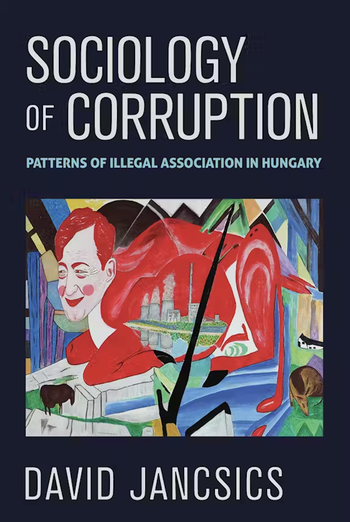What fostered corruption in Hungary? What are the most typical forms of corruption in this country? What do Hungarians think about it? What is the role of prime minister Viktor Orbán in this?
These questions will be addressed in the first RESPOND Seminar Series with David Jancsics, Professor at the School of Public Affairs at San Diego State University. He is the author of the recently launched monograph titled Sociology of Corruption. In the book, Jancsics proposes a novel sociological theory of corruption focusing on social status and relationships, network structures, and power dynamics as important explanatory factors of corrupt behaviour.
In Sociology of Corruption, a fresh approach is provided to the study of corruption in Hungary, which once seemed to be the most likely of the ex-communist bloc nations to catch up to the West and is, according to many experts and scholars, a country with a highly corrupt dynamic. Although his focus is on Hungary, Jancsics's findings apply to other nations and cultural contexts.
Based on data from 2022, Hungary is now the most corrupt member state of the European Union. There is also a consensus among experts that a small clique of corrupt political actors has captured most Hungarian state institutions and a significant portion of the business sector.
This seminar is part of the RESPOND Seminar Series, sponsored by the Horizon Europe research project RESPOND (Rescuing Democracy from Political Corruption in Digital Societies), with Professor Alice Mattoni (Department of Political and Social Sciences, University of Bologna) serving as the Scientific Coordinator.
About the speaker
David Jancsics is a Professor at the School of Public Affairs at San Diego State University, where he teaches courses on administrative theory, organizational development, and research methods, among others. He has been selected as a Fulbright US Scholar for Hungary for the 2024–25 academic year.
Jancsics received his Ph.D. in Sociology from the Graduate Center of the City University of New York. Before joining the SDSU faculty, he taught at John Jay College of Criminal Justice and completed a postdoctoral fellowship at Rutgers University in the School of Public Affairs and Administration.
His scholarly agenda centers on two fundamental questions: What are the causes and mechanisms of corruption and informal practices within a formal organizational context, and how are these practices embedded in outside social systems? His current research projects focus on border corruption, corruption networks, kinship and corruption, and the organization of corruption.
His work has been published in various academic outlets, such as Public Administration Review, International Public Management Journal, Administration & Society, and Sociology Compass. His book Sociology of Corruption: Patterns of Illegal Association in Hungary was published in April 2024 by Cornell University Press. His second book, Kinship and Corruption in Public Administration, is in progress and under contract with Palgrave.
Jancsics frequently consults with U.S.-based and international organizations and NGOs such as the United Nations, European Commission, U4 Anti-Corruption Resource Centre, Transparency International, U.S. Customs and Border Protection, and the U.S. Department of Justice.
